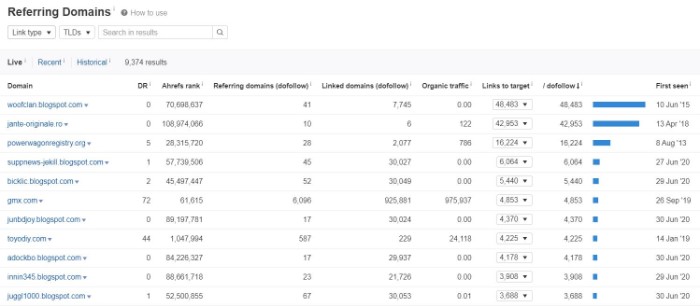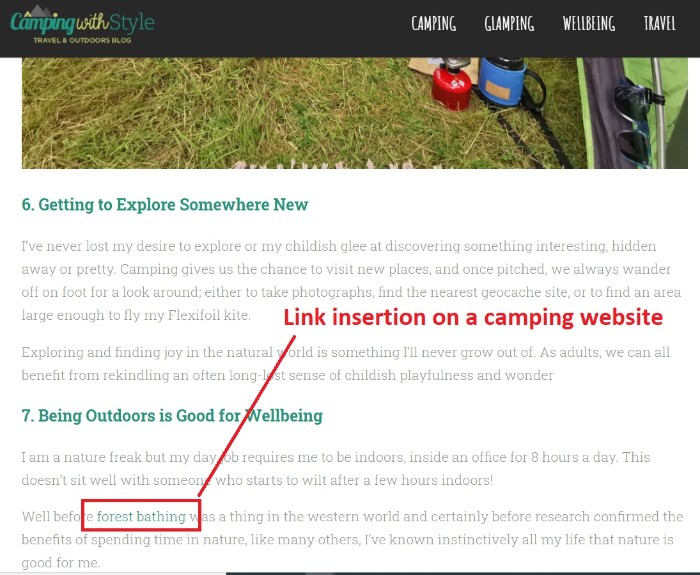Guest Posts vs. Niche Edits: What’s the Difference?
Join the 1,000+ brands that trust us for their link building.
Guest posts and niche edits are two of the most popular and powerful linking tools on the market. And yet looking around the SEO community, you can still easily find people confused about what the differences are and which, if either, is better for helping websites rank.
Essentially, a niche edit is where you place a link in an existing article, rather than writing a new article like you would if you were guest posting.
In this article, we’ll settle any confusion over guest posts and niche edits once and for all. We will compare the pros of each type towards the end of the article so that you may realize the benefits of using both.
What is a Guest Post?
A guest post is an article that’s written by a guest author and posted on another website’s blog. Something you write on your blog is known simply as a post, but you become a guest when you post something on another site’s blog.
Writing a guest post (aka guest blogging) is essentially the practice of contributing valuable and informative content to another person’s blog in order to gain exposure, foster a relationship, build authority, and acquire backlinks.
Guest posts are useful marketing tools because they help build your reputation as a subject matter expert and spread your brand to a wider audience. Guest blogging also establishes a relationship with the site owner that’s publishing the guest post and gives exposure to the writer by allowing her to build credibility within a niche.
As a guest writer, it’s important for your content to be informative, engaging, relevant, and high-quality in order to maximize its potential benefits and get readers to visit your website through the embedded backlink that’s associated with the guest post.
It’s generally understood in the industry that any guest posting arrangement entails a guest author receiving a backlink from the publishing website in exchange for writing a relevant and quality article for that website.

Getting a backlink is one of the most valuable aspects of guest posting since links are one of the most important ranking factors to Google. A backlink on a very popular and authoritative blog can provide a ton of link juice.
The link can be contextually embedded in the content or included in an author bio profile. An author bio link that’s associated with a guest post is a great way to attract visitors to your site and build a reputation as an authority figure.
Although getting a guest post to go viral is the best outcome for everyone involved, this isn’t necessary for it to add value. At the very least, the article should be 500 – 2500 words long (at least equal to or greater than similar content elsewhere) as well as engaging and informative.
Here are some best practices to consider when writing a guest post:
- The article should be well-written and informative to the audience.
- It should be at least 500 – 2500 words in length and properly structured/formatted.
- It should be niche-relevant if possible.
- Include link-worthy content that readers will want to share on social media.
- Include outbound authority links that are contextually relevant.
- Stay away from spam sites.
Anybody can write a guest post, but not everyone can write a good one. Guest posts can be paid or free. You can check out our article on guest blogging best practices for more tips on how to maximize the value of your guest post.
How Do I Get Guest Posts?
Let’s go through the step-by-step process of how to land a guest post:
Find the most appropriate websites
You want to find sites that are about topics of interest to you. Look for sites about a niche that you’re an expert on or sites that are relevant to your website. Identify blogs that may attract your target audience or blogs that publish content that your users want to read.
You can also use an audience overlap tool to discover websites that attract a similar audience to a target site and find out what other topics the target audience is interested in.
Analyze your competitors’ referring domains
Use a research tool that provides a referring domains report so you can see what sites are pointing to your competitors. A referring domains report shows you every backlink on each referring page of a linking website that’s pointing to a target site as well as all the referring domains that are pointing to each linking domain.
This gives you plenty of ideas to reach out to websites within your niche that may be interested in providing you with a guest post opportunity since they already have for your competitors.

Follow others who contribute to blogs
Following the footsteps of active guest bloggers on niche-relevant websites is a great way to discover potential opportunities. Often these writers will post their articles on their social media accounts. You can simply follow them and keep track of the websites they are writing for.
Narrow down your list of guest post sites
This is when you will qualify the list of websites you gathered from your initial search effort and identify the best ones that satisfy your goals. First, you need to make sure that a website accepts guest posts. Then you need to make sure the website attracts your target audience and receives a decent amount of traffic. You also want to make sure the website is authoritative and publishes high-quality content (e.g. high ranking sites).

Look for content gaps
You should review each of the websites on your target list to discover any content gaps. Filling content needs is about looking for topics that haven’t been written about (including any type of linkable asset). This will increase your chances of getting a guest post opportunity, especially if they’re relevant and add value.
Develop content ideas
Once you’ve selected your target sites and identified any potential content gaps, brainstorm some specific topics to write about. They should be topics that you feel comfortable writing about and showcase your expertise. They should also be topics that are relevant to the blog and add value to target audiences. Check out these Ahrefs alternatives to find useful tools for content discovery and keyword research.

Craft a guest post pitch
In many cases, you’ll need to reach out to a website owner or publisher to request a guest post opportunity as most natural websites don’t just hand them out like candy. This is when crafting a professional guest post pitch will become necessary.
The pitch doesn’t have to be sophisticated, but it should capture the reader’s attention, convey value, and clearly explain your intentions. You should try to find the direct contact information of an editor, blog manager, webmaster, etc.
Be personal and convince the reader that you will add value and explain the benefits of working with you. Make sure you understand the culture and niche of the website and read any guest post guidelines that may exist first. Provide samples of your work.
Buy them
If you don’t have the time or inclination to write guest posts yourself, then hiring a professional writer, placing orders with a content writing service, or contracting with an SEO agency are always viable options.
There are plenty of content writing platforms like ContentPit that will sell articles at bulk prices. There are also many independent content writers who will offer guest post services. Finally, there are link building SEO companies that offer guest post products and do all the work for you.
What is a Niche Edit?
A niche edit is a contextual backlink that’s inserted into a relevant, pre-existing article. These articles are aged (meaning the content pages have been indexed by Google for a long time), are niche-relevant, have pre-existing backlink profiles, and are preferably high-quality.
A niche edit sounds like a buzzword, but they’ve been around for a while and are one of the most popular types of backlinks.. Out of all backlinks, niche edits are most similar to guest posts, with a few exceptions:
- Articles or blog posts for niche edits are aged and guest posts are new.
- Niche edit pages already have backlinks pointing to them (pre-existing link juice).
- Niche content is already written so you only control the placement of the link/anchor text.
- Niche edits are typically cheaper than guest posts.

The goal of using niche edits is to get links inserted into relevant articles on established websites. Niche edit backlinks are ideal for adding relevance to your website. And because they’re dropped into aged and indexed articles that have already gained trust with Google, niche edits can really deliver a quick and positive impact in the SERPs within days.
Although you don’t have control over the specific content that a niche edit is contextually inserted into, you do decide on which niche the content is about. This makes niche edits a quick and effective tool for building relevance to your site.
How Do I Get Niche Edits?
You can manually acquire niche edits by reaching out to websites and trying to work out a deal for them to add your backlink to a relevant post, or you can just purchase niche edits from link building specialists.
Finding sites that may add a niche edit for you is a time-consuming task, but it can be done. You’ll want to search for sites that link out to content that’s similar to what is found on your website. Then you’ll need to reach out to someone associated with the website and see if they want to work out a deal with you.
In this way, manually getting niche edits isn’t much different than guest post outreach. You’ll need to contact a lot of people and preferably befriend some of them. Trust and friendship go a long way when conducting business.
You can either offer direct payment to the website owner for a link insertion or you can trade services for one. Sometimes you can make it seem like you’re trying to secure a guest post opportunity but instead request a simple niche edit instead.
By far the easiest way to get niche edits is to buy them. Link building specialists, like an SEO agency, have already established an outreach network of real and trusted websites dedicated to niche edits.
Moreover, the sites have already passed inspection and are guaranteed to deliver results. These specialists make sure that the websites have solid backlink profiles and the linking pages aren’t spreading their link juice too thin with multiple outbound links. This means all you have to do is choose a niche and order the links.
Which is Better?
Both guest posts and niche edits are powerful links with their own unique strengths. Your choice of one or the other will depend on your situation and strategic goals. Ultimately, it’s best to diversify your link building efforts with both guest posts and niche edits to get the best results.
Having said that, it helps to compare both links and reiterate their strengths in order to help you make an informed decision.
Both guest posts and niche edits are considered authority links. This means they are some of the most powerful, high-quality links for boosting rankings. They are designed to increase power, authority, and relevance.
The main difference between niche edits and guest posts is that niche edits are backlinks inserted into aged articles (with pre-existing backlink profiles) that are already indexed by Google. Niche edits are kind of like guest posts without the hassle of publishing a new blog post.
Niche edits and guest posts should be used together as part of a well-diversified link building strategy. Niche edits are great for fixing up a weak site since they can deliver a positive effect in a relatively short amount of time. Guest posts are great for adding authority and targeted relevance if you can find the right site to publish one on.
Niche edits do have the advantage of being placed into pre-existing articles so that link juice can flow more readily. Guest posts are created from scratch and can take some time to gain traction. Contextual links, like niche edits, are also some of the most powerful links. But a guest post link can be contextual too.
Let’s go over the unique strengths of each, starting with guest posts:
- Help you reach a wider audience.
- Build brand reputation.
- Establish the author as a subject matter (i.e. niche) expert.
- Content can be highly specific and tailored.
- Drives traffic to your website.
- Social media exposure.
- Boosts authority.
- Builds relationships.
And the strengths of niche edits:
- You don’t need to write an article.
- More easily accepted by site owners than guest posts.
- Improves ranking and target site health faster.
- Targets relevant niche-specific content.
You can see how both types of links have their unique strengths with some overlap. This is why they should complement each other to maintain diversity and contribute to a mix of authority, relevance, and power.
Last Words
A guest post is an arrangement between a website owner or publisher and a guest author whereby the author writes an article on the website’s blog in exchange for getting a backlink in the blog post (or author bio section).
Guest posting can produce high-quality backlinks which can boost rankings since they are considered to be contextual and relevant. It’s important to write high-quality content on the most authoritative websites possible to maximize the benefit for all parties involved.
On the other hand, niche edits are contextual links that are inserted into relevant, pre-existing articles. They are generally cheaper than guest posts and can deliver positive results faster since the linking pages are already indexed and trusted by Google.
Guest posts, although brand new, can generate more referral traffic than niche edits and also offer more tailored content that is highly relevant.
Both guest posts and niche edits are powerful links that are widely used in the SEO industry, and they should be used together as part of a diversified link building approach.
Contributing Author: Brian Kihneman
 Article by:
Article by:
Nicholas Altimore
Hey I'm Nick, the Founder/Director here at SirLinksalot. I have a passion for building online businesses and taking websites to the next level with the help of my amazing link building team.
 Questions or Comments?
Questions or Comments?
We are active in our Facebook Group seven days a week and would love to hear from you. Ask us questions, learn from other group members, and share your knowledge.
Related Posts
Ready To Start Building Your Rankings?
Your link building journey to the top of Google starts today!
Apply for Managed Link Building to get a free analysis and game plan, or order backlinks a la carte.
Link building services that work.


